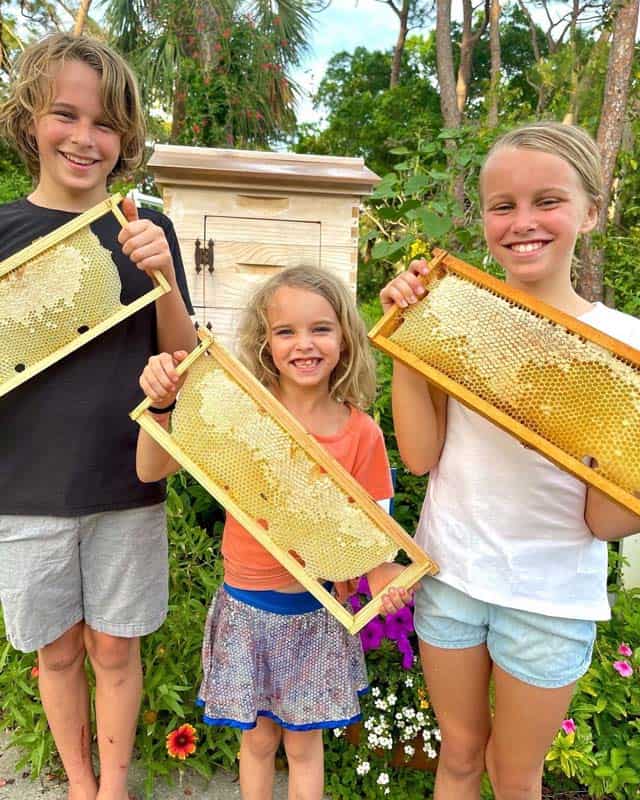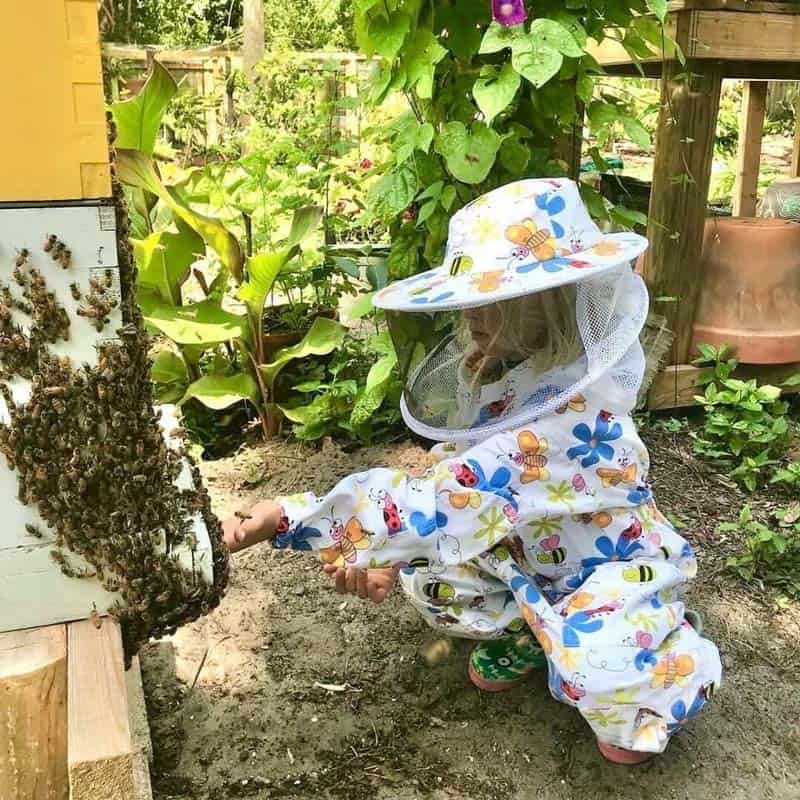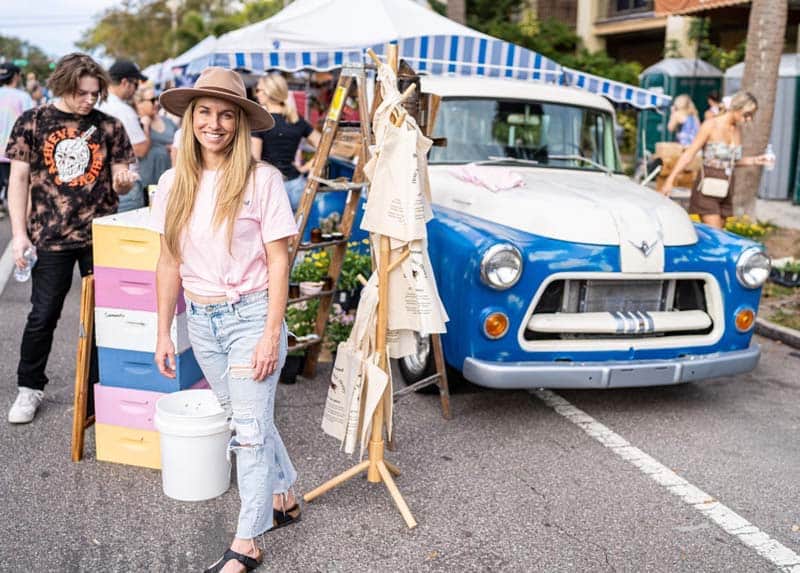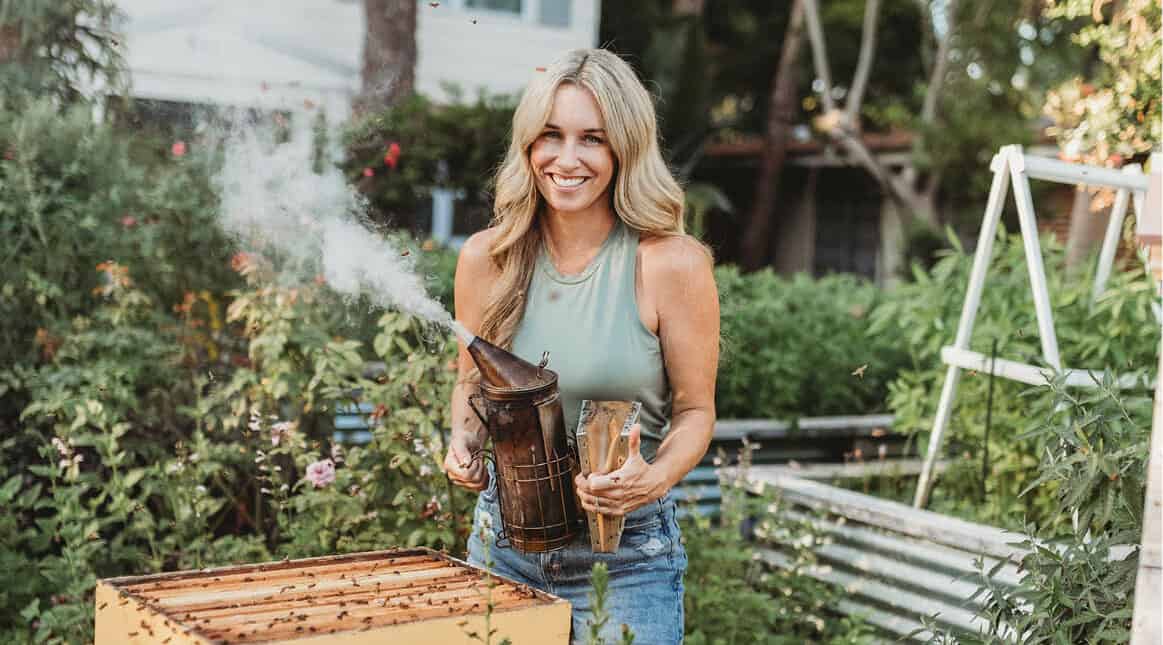Meet Elisha Bixler of @howsyourdayhoney, Tampa Bay’s Bee Queen
St. Petersburg mom Elisha Bixler has a sweet job. Her company, How’s Your Day Honey, bloomed from her passion for bees, beekeeping and honey. Bixler is dedicated to educating people about the importance of bees and how they play a key role as pollinators in our food supply. Her goal is to help build a sustainable environment and teach others to protect our honeybees.
How’s Your Day Honey produces and sells local honey and provides a bee removal service. Elisha began posting videos about her garden and bee removal on social media to inspire others and spread awareness about honeybees.
In late 2020, she joined TikTok and has since gained over 800,000 followers. One particular video showing the bees doing what’s called “queen balling” currently has over 30 million views.
In addition to helping the bees, Elisha is also a busy mom to her three children – Gabriel, 12; Adelaide, 10; and Quinn, 8. She recently talked to us about what she does and why she does it, and how we can do our part to save the bees.
How did How’s Your Day Honey get started?
Elisha Bixler: I've always had an interest in plants and growing a garden and tropical fruit trees. Our family was going through a ton of honey at the time. I also like to know where my food comes from; it’s just a concern of mine. And I thought ‘I am going to start with a couple of hives in my backyard.’
So, I found somebody selling nucleus colonies. Those are just smaller, starter hives. I bought those and took off from there starting with a couple and now I have around 125!
It was quite a journey, and a lot of mistakes were made. It was just such a learning curve. I really didn't know how complicated the bee world was. You think, ‘oh, I just want to have this honey.
Just like gardening we can just start with a tomato plant, and you learn from there.’ Well, with bees it’s really learning bee biology, entomology and insect behavior altogether. It was overwhelming at times, but I pushed through and here I am! I like a challenge.
What do your kids think of the bees?
Elisha Bixler: We've got our urban homestead here. We have a half-acre property and we've got chickens and ducks and lots of fruit trees. We pretty much have an edible yard and the kids just love it.
My natured, barefooted children that play outside and climb trees in our yard. My older two have had a hand in it. They’ll get a break from school and will help me. My middle child really has a passion for it.


Do you get nervous when you do the bee scooping? Can the bees sense nervousness?
Elisha Bixler: I still get a little bit like, ‘OK, are you going to sting me?’ I usually do get stung when I do the scooping because even on accident, if their little stingers are sticking out, they're barbed so it will snag your skin. But it's just worth it because it just feels really cool and warm and Velcro-like, like they're all kind of stuck together and you're pulling them apart. I just love the sensation of it.
But getting stung is hit or miss. I was doing a removal of a smaller colony in a palm tree and thought ‘I don’t need to wear protection today, I’ll be fine.’ I opened it up and took about three bee stings to the shoulder! It hurt so bad and reminded me of getting a shot.
Yes absolutely 100% they can (sense nervousness). The people that are terrified of bees are the ones that get stung first. Honeybees can sense our carbon, like with heavy breathing, and know when we're nervous. It's like we have a faster pace about us and so they go towards our mouth, our nose and our eyes.
And they'll go right up your nose, which is terribly uncomfortable!
What’s the process like to remove bees from an unwanted area?
Elisha Bixler: I'm usually using smoke right away. The smoke masks their alarm pheromone and bees communicate through scent. They don't have ears, and so when you're using smoke, it kind of covers that up. And then also it'll help just kind of navigate the bees out of your way.
So, when they smell that smoke, they immediately start gorging on honey and they're kind of distracted in a way. Smoke is your best friend!
How can you pinpoint the queen bee so quickly and what makes her different from the other bees?
Elisha Bixler: If you were good at Where's Waldo, then you can find it! It's the same idea. It all kind of looks the same, but there's just a slight difference in the way my eye just catches it. There are plenty of trained beekeepers that still cannot find a queen.
Her abdomen is going to be twice the length from all the eggs and then her thorax on her back is going to be black and shiny. There's no fur like her daughters.
The only difference between the queen and a regular honeybee is that she's fertile. She was fed royal jelly as a larva, and it just made her fertile and she grew ovaries. The rest of the bees, her daughters, do not get the royal jelly diet. They get mixture with something called bee bread and that makes them infertile.
The queen goes out after she hatches, and she mates. She has all the eggs she'll ever need. She only mates one time and then she comes back to the hive. The queen can lay 2000 eggs in a day!
My favorite fact is that the queen does nothing – she doesn't even feed herself or groom herself. She just has to do whatever her daughters say – her daughters are in charge.
Your most viral TikTok video was about “queen balling.” What exactly is that and why does it happen?
Elisha Bixler: A lot of different reasons—if there’s an impostor queen, if there's a smaller swarm, or sometimes bees will try to move into an established hive. They will kill her, and that's just how they do it. They put her in that tight ball and buzz to heat her up and then they'll bite her.
Sometimes they'll kill her when she's not laying eggs any longer and she becomes kind of useless, so they have to get rid of her.
Tell us about the honey process! Is it safe to eat the honey that bees make even when they’re trapped in walls and uncommon areas?
Elisha Bixler: When I do a removal somewhere, honeybees are very hygienic, so all their hives are pretty much sterilized there. All their byproducts are antibacterial antimicrobial, especially a product called propolis. They’ll kind of coat everything in it. Plus, if anything foreign gets in their hive, they’ll coat it in this byproduct to sterilize it.
So, honey is mostly sterilized inside of a hive, even if it is like the one in a big bathroom shower wall I recently did. It’s perfectly fine to eat! I did offer some to the homeowners and they took it.
I don’t personally do anything with it because I’m not allowed legally to take it and resell it. It’s also an extra step that I just can’t take. It would be too much work. Also, if it’s watery or bubbly, that means it’s fermented. Sometimes there can be too much moisture in honey and that can make it go sour.
Depending on your area, honey is seasonal. You don’t get to choose whenever you want to get honey. It’s going to happen when a lot of flowers are blooming called nectar flow. So usually for Pinellas that happens twice a year, summer and then fall and after it’s done, it’s usually about four to six weeks that all the flowers bloom all at once. The bees work hard collecting all the nectar.
Once it’s done, they put it inside of their hives. They cover it up with a wax capping almost like a lid over each cell, and then I go in, smoke the bees, get the bees off of the frames, and take the frames inside to do my honey processing. Then I cut off all those little lids called the wax cappings, put them in a centrifuge and then I thin out the honey. There is no shelf life for honey, as long as it doesn’t have moisture. It’s the moisture that ruins it.
Now in Florida we have a higher moisture content of course, so it is a little more common to find fermented honey.
Is it true that local honey can help combat seasonal allergies?
Elisha Bixler: I would say that it’s a tricky answer because it depends on your allergy, and that's what I tell people at markets when they're buying it. If you have an oak allergy then no, seasonal honey isn't going to do anything for you. If you have an allergy to, let's say, ragweed and some other flowers in general that are blooming, then yes, it’s going to be excellent for your allergies specifically from your area. You want to find honey right from your neighborhood within a few miles.
For those oak and pine allergies, honeybees do not harvest any pollen, honey or nectar from those trees. Depends on what they are harvesting, but it's the same idea – it's just like taking an allergy shot.
If you're allergic to ragweed, honeybees will harvest from ragweed, and so they're taking the pollen and nectar from those flowers and placing it in the honey. And if you ‘re having a little bit every day, you're going to see improvement.

What can you tell people who have a fear of bees?
Elisha Bixler: I would say never be afraid of the bees because it's not common to be by a honey beehive. Honeybees are only going to sting you if they're protecting their colony, and that would mean you being right by where they're coming in and out of where their queen is, the babies and the honey.
Any time there are children visiting a flower out in your yard, I always tell them, ‘close your eyes and tell the honeybee I'm not a flower. My name is – and tell them your name. Because then the bee will go away because the bee doesn't want anything to do with you.’
Honeybees also die when they sting you. So especially when they're out and they're working hard getting pollen and nectar, they're busy. They have a job to do! They don't want to end their life. Not unless they're right by their hive and they have to protect it. They will fight to the death.
Raising butterflies are great to teach children not to swat at anything or be afraid. Being involved in it, you're going to see that the insects are not going to hurt you. I know people that are afraid of butterflies that duck when a butterfly flies by because they weren't exposed as a child, so they think, ‘oh no, something is flying by. Get out of here!
What advice would you have for someone who wants to take up beekeeping?
Elisha Bixler: I would recommend joining a beekeeper’s club. It’s the number one thing to do so that way you're going to meet people, mentors … and there are mentorship programs. A lot of the local beekeeping clubs in Tampa and Pinellas have a ‘hive day’ where you can go out and experience it and get hands on and open up a beehive to really get the full experience to see if this is the right hobby for you.
Then you're going to meet a network of people you know, just like a mom’s group. You're just going to meet everybody and get opinions and just really get a feel for whether or not this is something that you want to go further with. There are a lot of people that join them and don't get bees for years.
They just like meeting the people and they are happy with going in once a month and being with the bees.
Any final tips that you want people to know about the importance of bees?
Elisha Bixler: So, these native bees, these are the ones that are in trouble. With honeybees, people like honey and we need honeybees for pollination. But our native bees are the solitary bees that live in our yard that we don't even know exist.
Letting native weed grow and leaving a piece of your yard untouched and unmanicured is good because that's where the native bees are going to be. They’re mostly ground nesters or deadwood nesters.
It's really like spreading awareness for our sweet, beautiful, little native bees. That's where my heart is and what I hope everybody can be a little more mindful about. Chemicals and yard sprays can pretty much contribute to the decline when people use pesticides or they see bees and they automatically think, ‘oh, I have to go spray over there because I saw a bee.’
You also visit schools, right?
Elisha Bixler: We offer a 60-minute honeybee presentation and bring an observation tank with live bees! We discuss how honey-bees are responsible for most of the food that we eat and share some of our favorite bee facts. We also bring in tools, a suit and honeycomb to sample. This is always a fun educational hour that kids and parents go crazy for!
Do you have any advice on planting your own pollinator garden in Tampa Bay?
Elisha Bixler: This is my favorite! It is where my heart is. I would say native flowers are your best friend and some of our native flowering weeds. This is a very touchy subject because people don't want the messiness or he messy look of the native flowering weeds.
We have a flower, which I'm sure you've seen. It's called Bidens Pilosa or Spanish needle, and it's this little white daisy, and it is Florida native and is a major nectar and pollen source for all bees, not just honeybees.
For our native bees that we need that are declining so badly, I always tell people to just leave a small patch in your yard untouched and let some of those native weeds grow. It'll really give you the biggest bang for your buck if you want to see pollinators in your yard.
I think most people assume ‘it’s just a weed, I have to pull it.’ But some of them are actually so beneficial for our native bees. They really need those little flowers to build them through spring.
And if you want to buy a garden, I will say fully support our native nurseries or local nurseries. Sometimes the big box stores are not going to offer beneficial pollinating plants for our bees that are specific to our area, so they're going to sell more of your commercialized things. Also, they're going to use systemic pesticides.
Because they want the plants to look amazing sitting on their shelves. I like your local nurseries, especially the native local nurseries. They are going to offer you things for our Tampa Bay area and for pollinators.
You can find Elisa on TikTolk @howsyourdayhoney3 and on IG @howsyourdayhoney.
Originally published in the April 2022 issue of Tampa Bay Parenting Magazine.


